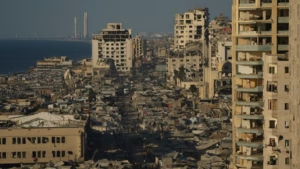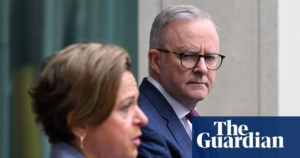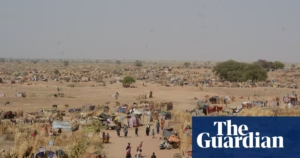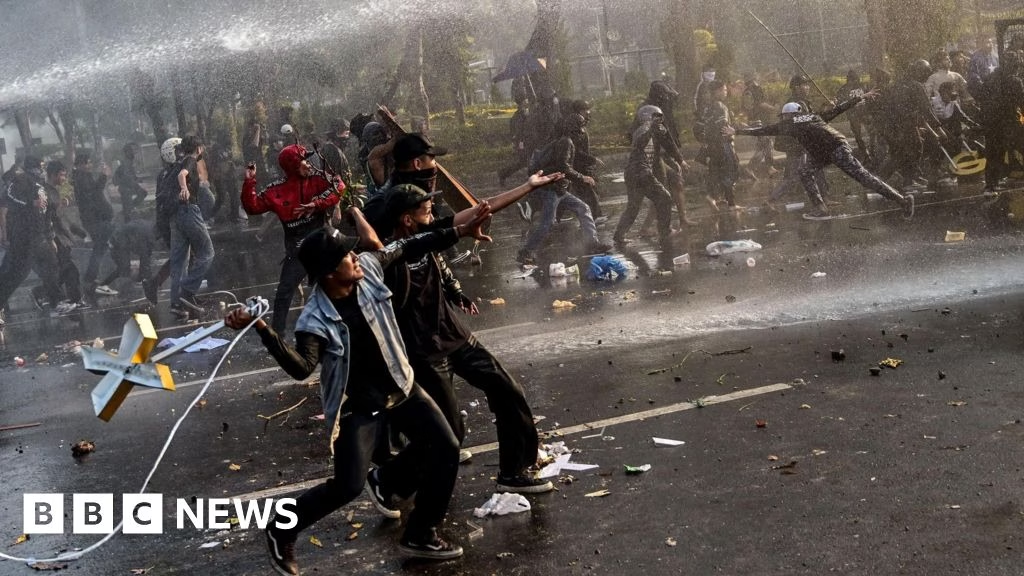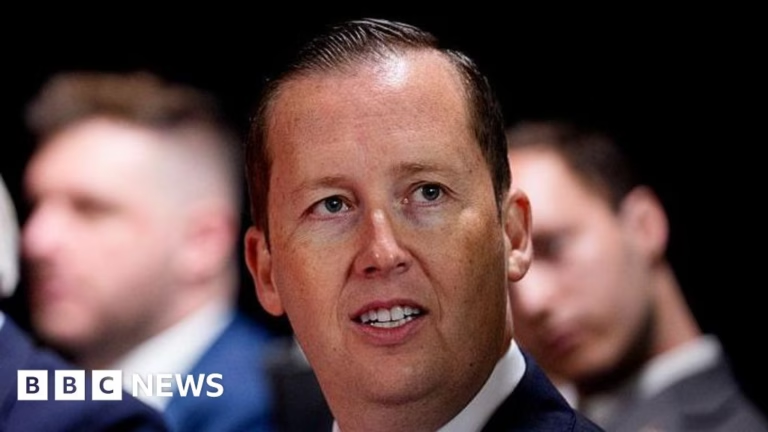Protesters have been killed, buildings torched, and politicians’ houses looted as anti-government unrest spreads across Indonesia – and the authorities respond with force.
Mass demonstrations, fueled by cost-of-living woes and public frustration with the political elite, first erupted in Jakarta on 25 August to condemn what many viewed as excessive pay and housing allowances for parliamentarians.
By the end of the week, things had boiled over into violence. On Thursday night, following escalating clashes between demonstrators and authorities, police in Jakarta ran over and killed 21-year-old motorcycle rideshare driver Affan Kurniawan.
President Prabowo Subianto and the chief of police apologised for his death – but it fueled further discontent that has now spread to various corners of the archipelago, from West Java to the islands of Bali and Lombok. At least seven people had died in the protests by Monday, according to Indonesia’s coordinating minister for economic affairs.
The perks that sparked a protest
The primary trigger for the protests was the Indonesian government’s decision to raise the allowance for national parliamentarians.
Local media last month reported that they were paid upwards of 100 million rupiah (£4,499; $6,150) a month – more than 30 times the average national income – including a substantial housing allowance.
Meanwhile, everyday Indonesians were struggling because of a cost-of-living crisis.
“As the government is undertaking austerity measures, and at a time when citizens are feeling economically insecure, the notion that Indonesia’s already wealthy political class would see their incomes rise filled people with rage, and they spilled onto the streets to express that rage,” Dr Eve Warburton, director of the Indonesia Institute at the Australian National University, told the BBC.
These protests spiraled after Affan’s death, and have since grown to encompass issues of police brutality and accountability. But there are other systemic issues driving the public anger: political corruption, social inequality, and economic headwinds from which the rich and powerful seem unfairly insulated.

Getty Images
“Elites seem cloistered in a life of luxury – as seen in the exorbitant perks received by parliamentarians – grating people’s sense of justice,” Vedi Hadiz, professor of Asian Studies at the University of Melbourne’s Asia Institute, explained.
In an attempt to quell the nationwide protests, President Prabowo announced on Sunday that several state-funded perks given to politicians would be reined in, including the size of some allowances.
While the move was welcomed by protesters, some suggest it doesn’t go far enough.
Herianto, a former central co-ordinator for the All-Indonesian Students’ Union, told the BBC that the announcement was “a step in the right direction, but it does not address the root causes of discontent”.
“It is not only about one issue, but about long-standing concerns with inequality, governance and accountability,” he explained. “Symbolic changes are important, but people expect deeper reforms, particularly in areas that affect ordinary citizens such as agricultural policy, education and fair economic opportunities.
“The ultimate goal is to push for a more accountable, transparent, and people-centred governance.”
The crackdown
At the same time as winding back politicians’ benefits, Prabowo also ordered the military and police to take stronger action against rioters, looters, and arsonists after homes of political party members and state buildings were ransacked and set ablaze.
Protesters torched regional legislative council buildings across multiple Indonesian provinces. In the city of Makassar, a local parliament building was set on fire, killing at least three people and injuring several others after people reportedly became trapped inside the burning building.
Meanwhile, in Jakarta, angry mobs raided and looted luxury items from the homes of several members of the regional legislative assembly, who previously made unsympathetic remarks about protesters who had criticized their high salaries.
Getty Images
The unrest prompted Prabowo to cancel a visit to China, promising to monitor the situation directly and find a solution.
TikTok has also suspended its live streaming feature in Indonesia “for the next few days”, in a bid to limit potentially inflammatory content amid concerns about live mass mobilisation.
Herianto says that authorities’ handling of the situation overall has been “mixed”.
“On the one hand, there have been some attempts to maintain dialogue, but on the other hand, the use of excessive force has raised concerns,” he said. “Authorities should protect the right to peaceful protest, not suppress it.”
Prabowo’s instruction to authorities to intensify crackdowns – including turning off lights in protest areas and using rubber bullets – has further stoked Herianto’s concerns, raising fears of police brutality.
“History has shown us that when the state prioritises security measures over dialogue, the risk of excessive force and human rights violations increases,” he says.
“We hope the authorities act with restraint and prioritise de-escalation rather than confrontation.”
An opportunity for change
It is unclear where the protests will go from here – whether they will continue to spiral into further violence and repression or force the government to cede more ground.
But whatever the outcome, the situation represents Prabowo’s most serious leadership challenge since becoming president in 2024.
“It’s a major test,” said Dr Warburton. “Can he placate the protesters and bring an end to rolling demonstrations, while not resorting to excessive state violence or repression? This is the question.”
An ex-special forces commander accused of serious human rights violations, Prabowo reinvented himself through “cute” TikTok videos to win over younger voters. But many Indonesians remember him as the son-in-law of the military dictator Suharto, who swiftly rose through the ranks of an authoritarian regime.
His victory in the election last year was greeted with some disquiet, and he faced the anger of student protesters over budget cuts to health and education in February this year.
Prabowo certainly knows the power of student protests – they were instrumental in bringing down Suharto’s regime. So how he responds will be critical.
Monday saw a brief lull, as some Indonesian students and civil society groups cancelled protests in Jakarta, citing “impossible conditions” after the authorities escalated security measures in the capital.
Police had set up checkpoints across the city, while officers and the military conducted city-wide patrols and deployed snipers in key locations.
Some experts warn that recent escalations could be the tip of the iceberg, however, as many fundamental economic issues remain unresolved.
%)
Additional reporting by BBC Indonesia
Source: https://www.bbc.com/news/articles/c2dj9w306wzo?at_medium=RSS&at_campaign=rss
